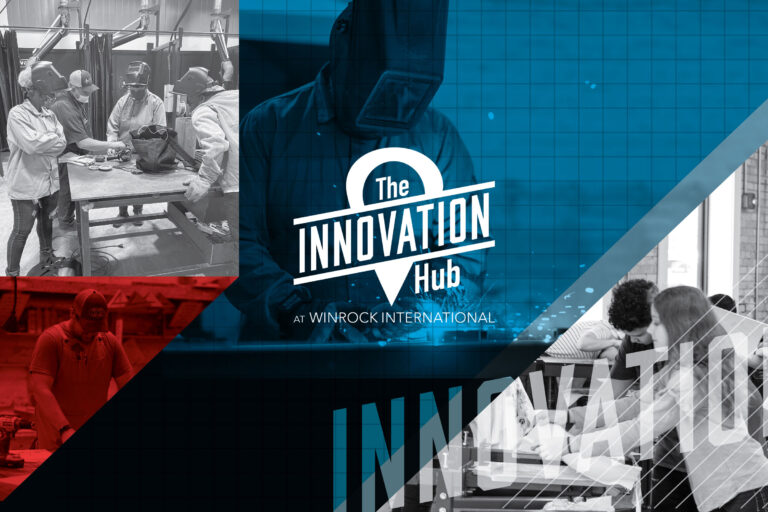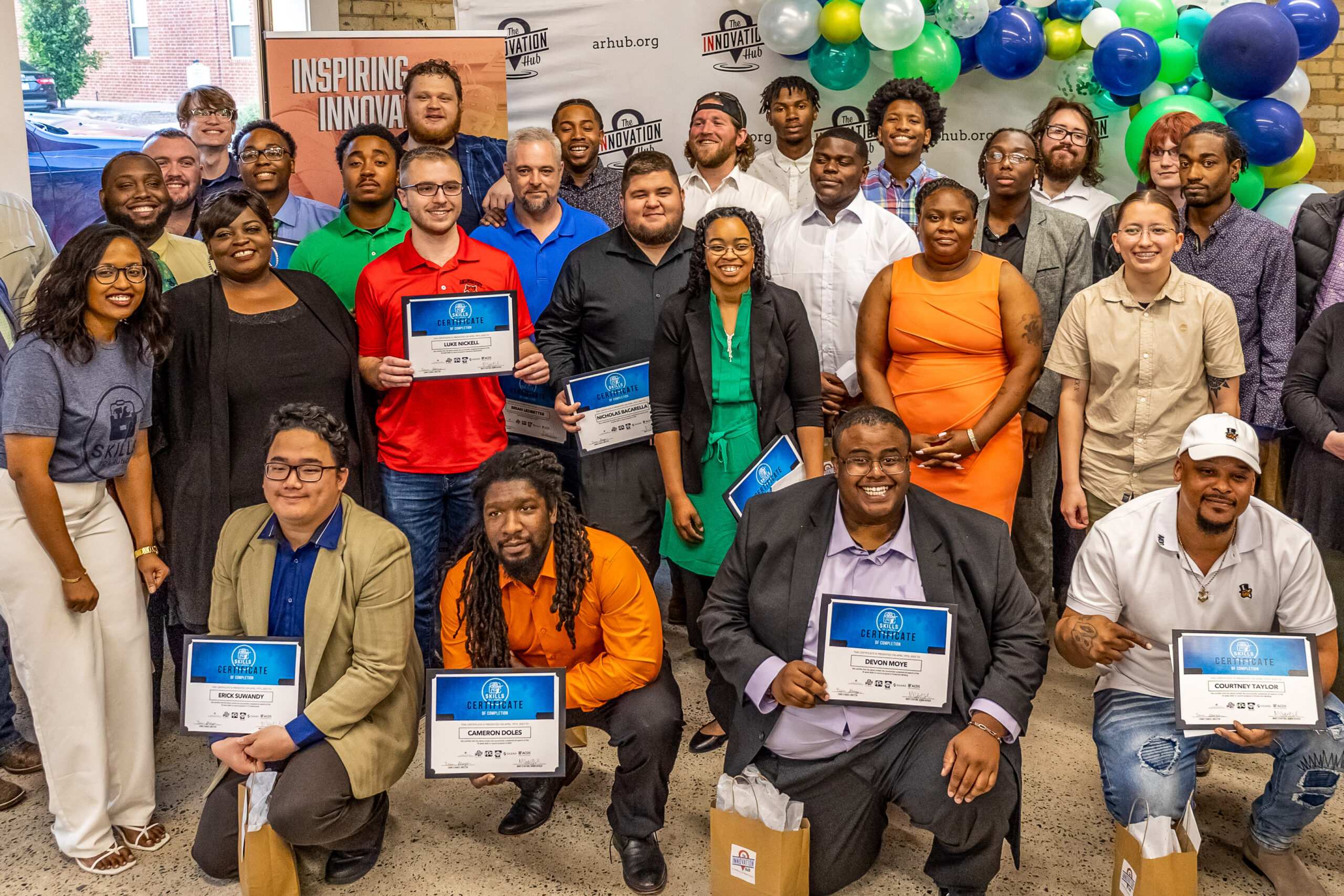
Transforming youth trajectories through Skills to Launch
After graduating high school, 18-year-old Joseph Flores of Bryant, Arkansas, was at a crossroads. He wanted to advance from his position as a general laborer at U.S. Vanadium Holding Company but couldn’t see a path forward. He was helping out at the Hot Springs-based chemical manufacturer wherever needed, whether shoveling leftover milled material or operating a forklift.
Flores was interested in learning about welding as a potentially lucrative and more rewarding career track but didn’t have money to pay for classes. That’s when an acquaintance told him about a trade skills training program called Skills to Launch (STL) offered by Winrock International’s Arkansas Regional Innovation Hub.
Skills to Launch is a 10-week intensive program that provides training to young adults in trades including solar panel installation, construction, production welding, industrial maintenance, and heating, ventilation, air conditioning and refrigeration. It includes a pre-program OSHA-10 training course that covers general safety and health hazards for entry-level workers.
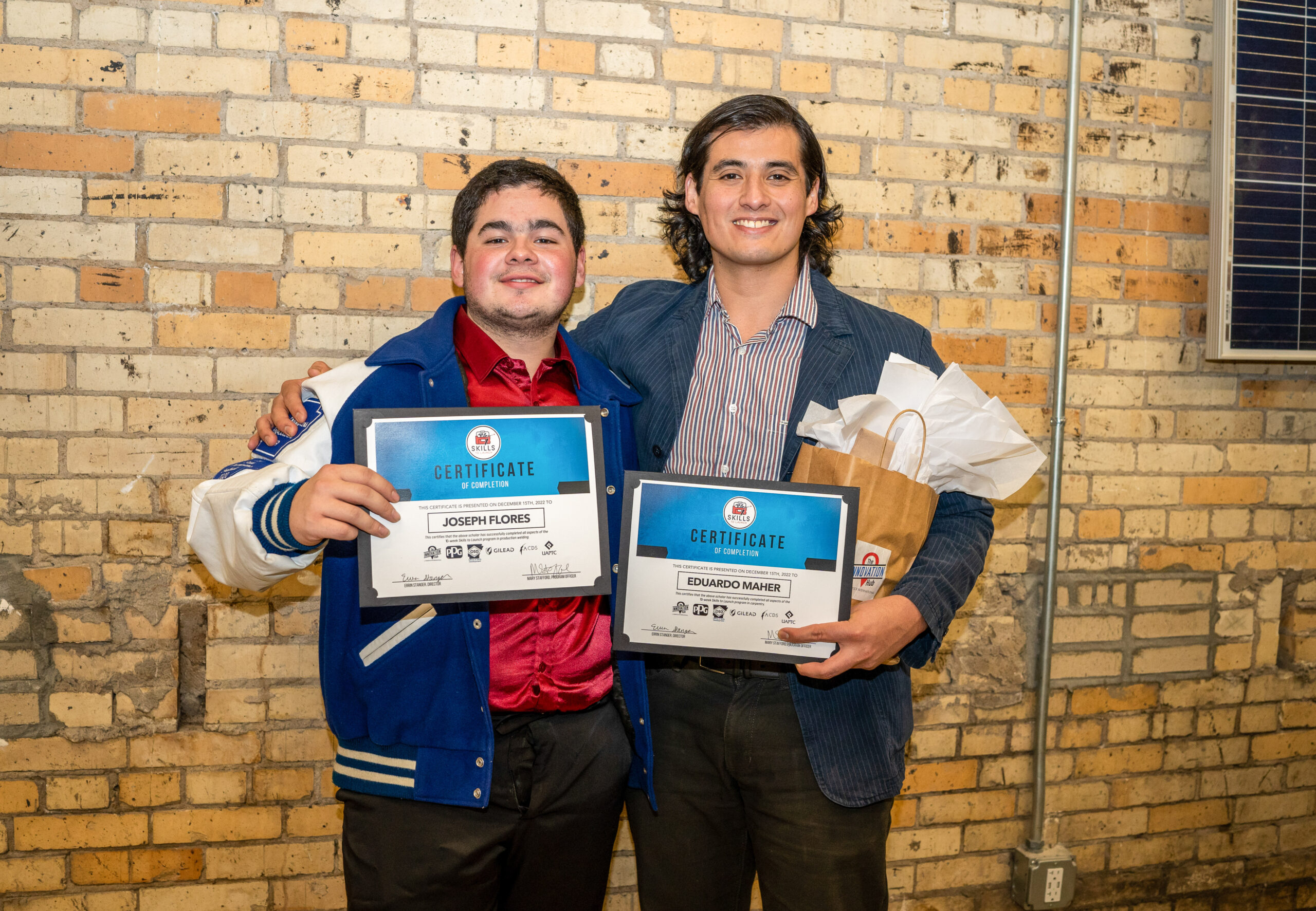
The STL program provides hands-on training in selected tracks delivered by working trade professionals, as well as a soft skills course taught by the Hub’s Mary Stafford. Soft skills are non-technical but invaluable competencies that can help young job market entrants obtain employment and perform successfully. They include how to develop a resume, write a cover letter and introductory email, and how to prepare for and confidently present oneself; Stafford even holds mock interviews to help trainees practice competently navigating what, for some, could be their very first employment quests.
Now, more than ever, youth worldwide need improved access to better, more affordable trade and skills training opportunities like those provided by the Hub. According to the U.N., over 600 million jobs must be created over the next 15 years to meet youth employment needs.
“Technological advancements and shifting labour market dynamics increasingly call for agile and adaptable skill sets,” the U.N. states in advance of the annual World Youth Skills Day observance. “It is crucial that we empower young people to navigate these changes effectively. Technical and vocational education and training is well placed to meet these demands by reducing access barriers to the world of work, ensuring that skills gained are relevant, recognized and certified.”
Back when STL first began in the fall of 2020, COVID was wreaking havoc on global economies and job markets. The STL training program was timely, helping to fill the gap as the pandemic flipped both schools and workplaces into lockdown mode. As COVID spread, it caused significant delays in learning preparedness for high school, college and vocational school students, leaving U.S. K-12 students five months behind in math and four months in reading, according to one McKinsey report.
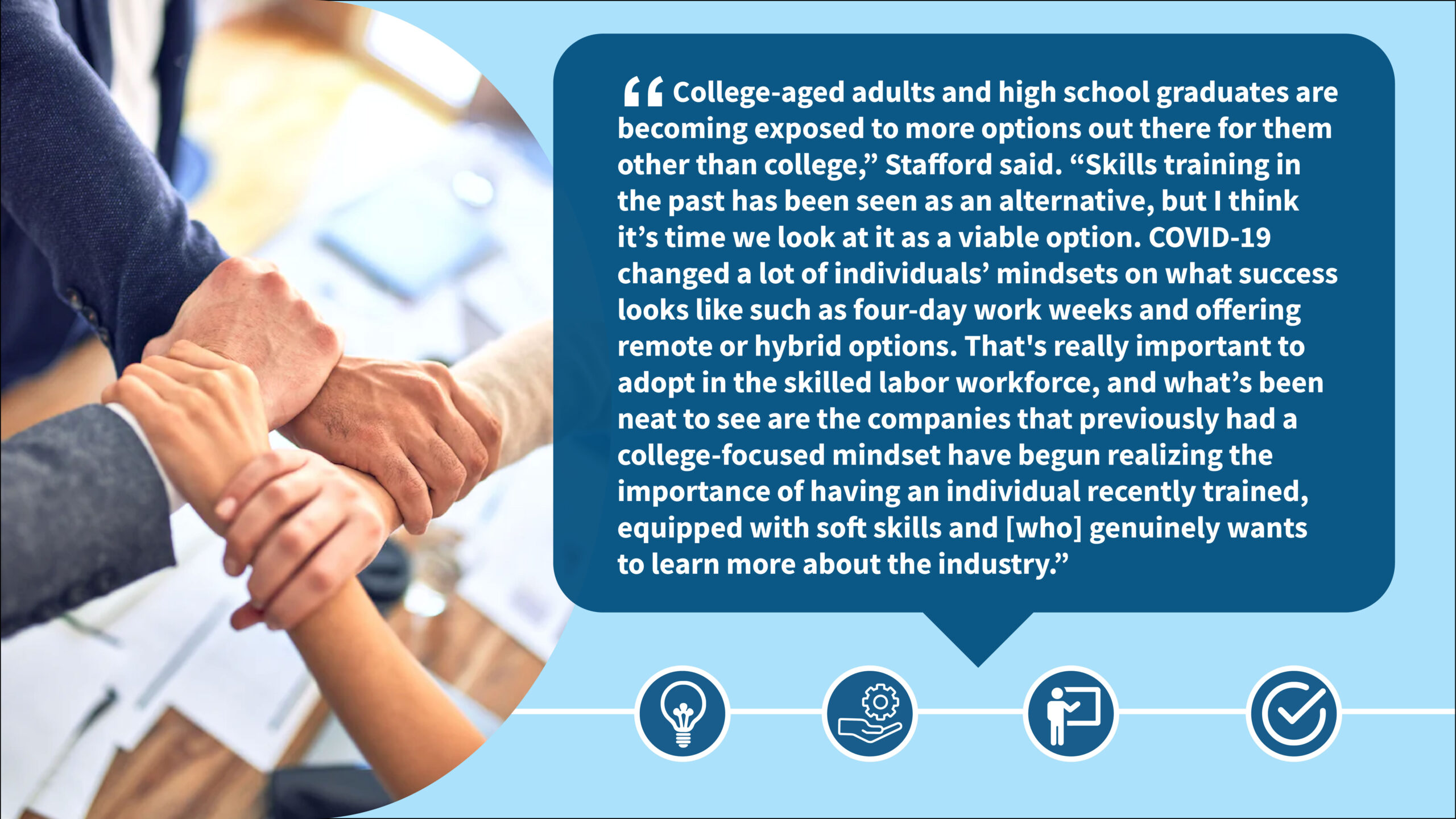
In addition to providing trade-targeted job training, STL is contributing to local and regional economic development by developing a better-skilled workforce. The program started with seed funding from The Goldstein Family Foundation, Alter Trading Corporation, and Union Pacific Railroad, and collaborates with a range of private and public sector partners.
So far, STL has achieved an 85% job placement rate for participants, and 111 people have successfully completed training ─ or in some cases, earned promotions. For example, after Flores entered the program, he began exploring new opportunities and even received a few better job offers from other companies. Worried they would lose a good employee, U.S. Vanadium offered him a promotion with higher pay.
Flores said STL’s welding course taught him how to draw and plan welds, cut steel using a grinder and how to define the thickness of metal needed for each weld. Toward the training’s end, he was challenged to make a weld that incorporated everything he had learned so far with a project that had to be square, with corners and legs. Flores made a sturdy, 3’x3’ steel firepit.
“I really enjoyed going to each class,” said Flores, now 19. “Each class was fun because each instructor cared about what they were doing. It wasn’t a program where everyone was going through the motions of it, and Mary definitely put an extra 10 cents in every way she could.”
The program has grown since its start, with more scholarships, cohorts and trade track options available; eligibility also has expanded to include participants older than 24. The first step involves applicants completing a scholarship application. Interested participants must go through an application process that includes interviews and track placement, but if placed, STL is free for individuals that are chosen to participate because it is 100% grant funded.
“This program has become an integral part of the Innovation Hub,” said Innovation Hub Director Errin Stanger. “We were looking for the best way to impact workforce development and we have found our answer in Skills to Launch. It gives individuals an opportunity to start a career and build confidence within themselves. We are excited to watch the growth of an individual as they experience Skills to Launch and we look forward to many years of changing lives and expanding opportunity.”
Collaborating with diverse local partners enables participants to work on community service projects. These enable youth to work alongside real-world trade professionals, and possibly even gain employment with them later.
One new skills track option added in 2023 is solar panel installation with Seal Solar, a local energy contractor. JD Poole, the company’s vice president of construction services, began teaching solar panel installation to STL participants in the spring. When the first solar cohort graduated, Poole gained an intern: 23-year-old Nickolas Henry. Poole said Henry stood out as passionate, ready to learn and eagerly took notes about solar panel installation.
Henry didn’t have a chance to further his education right after high school because he was the designated primary caretaker of his grandparents. He was working at a local Domino’s while pondering next steps and applied to STL after seeing a post about it on Facebook. He said he loved the idea of working in renewable energy and making an impact by helping people make long-term investments in solar.
In the solar track, Henry and other participants learned safety procedures and the basics of installation in the first four weeks. The next six weeks were spent on the job with installation crews learning to switch out panels, put them on racks and wire management during installation.
“There’s not enough skilled laborers or apprentices in our state that know how to understand technology and what it takes to do this job,” Poole said. “We need classes. We need schools. We need programs to develop trades and skills that are paramount to the growth of our state, including electric vehicle charging. There’s so many avenues for green energy trades.”
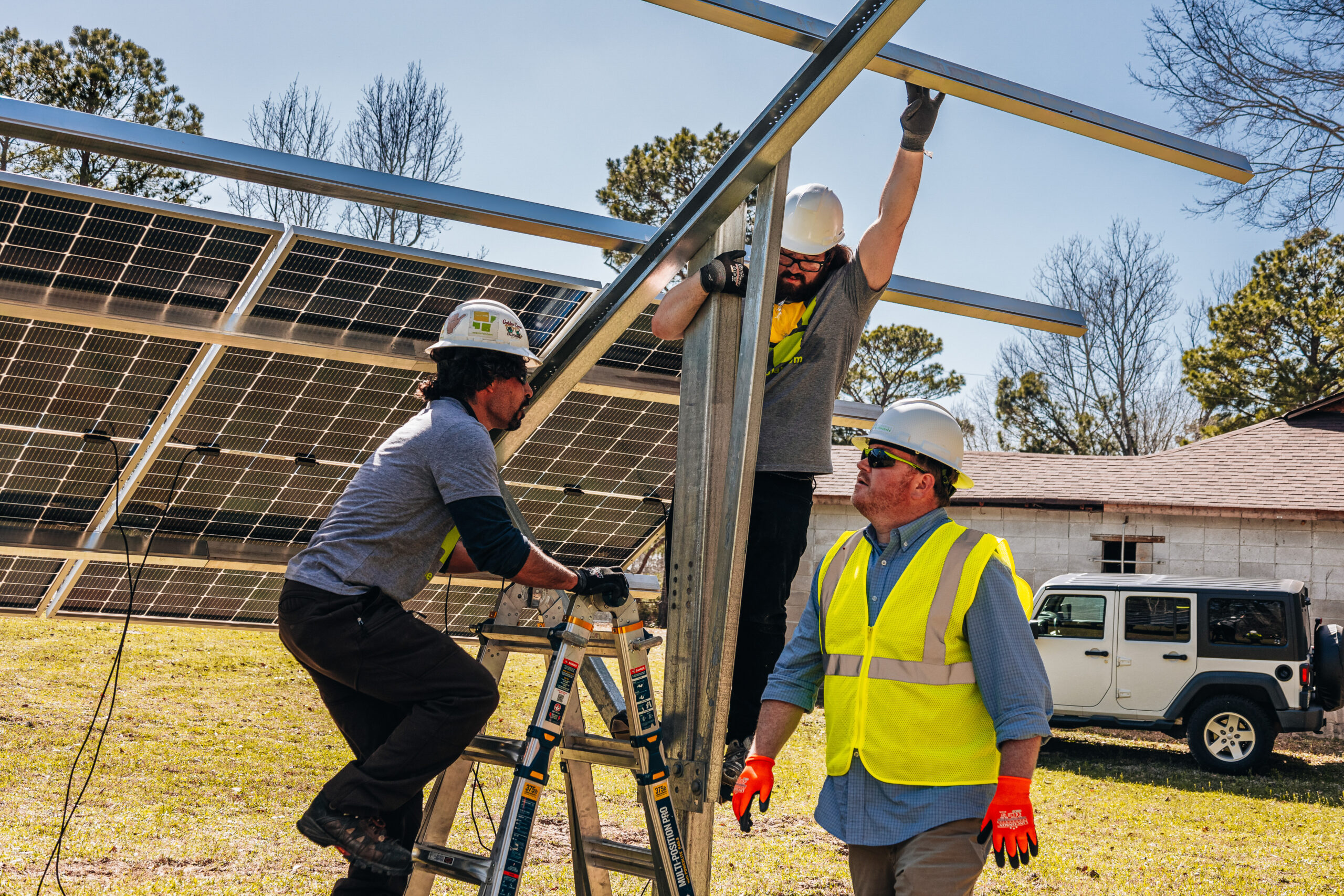
But for Stafford, and for students like Henry and Flores, one of the most resonant aspects of STL is the soft skills side, including learning how to confidently market oneself to a prospective employer ─ getting comfortable building a narrative around your attributes, telling a compelling part of your life story, and sharing relevant information about what matters most to you. It’s a common theme in the program; the first question Stafford asks participants in the course is: what’s your story?
“You can spit out as many numbers as you want about the success of the Skills to Launch program, but what is so special is that we maintain these relationships with those who have gone through the program,” Stafford said. “It’s always a program where they feel welcomed. It’s really cool to see [former] students who pop in, they’re in their new uniform, loving their new job. It’s the impact that the program has really had on the students.”
And the reason they keep coming back?
According to Henry, it’s what “The Innovation Hub has done for us. It’s such a noble task to allow people to transform their lives and do something more with it if they are willing to put in the work and effort. With the last cohort, all I saw were a lot of people looking forward to bigger and brighter days. It was a very transformative experience, and I could not be more thankful.”
To learn more about Skills to Launch, click here.
Related Projects
